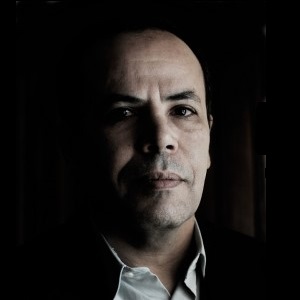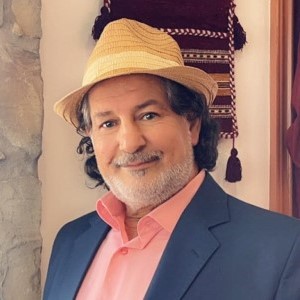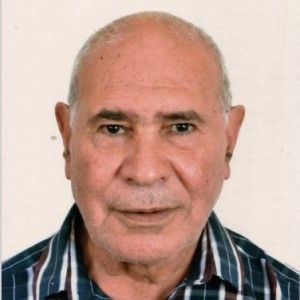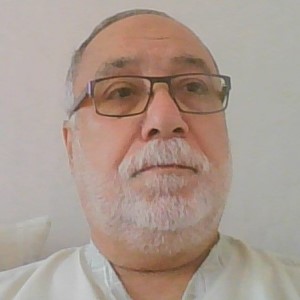ترجمات أدبية
Ali Al-Kasimi: The Call

by Ali Al-Kasimi
Translated by Hassane Darir (Professor of Translation and Terminology, Cadi Ayyad University, Marrakech) and revised by W Richard Oakes Jr. (PhD-University of Edinburgh, Independent Scholar)
***
When my friend, Sidi Muhammad, passed away, I felt loneliness surrounding me on all sides, and I had no way to escape from it. For, before his death, whenever I felt depressed and alienated, as if I were engulfed in a black cloud, I hastened to his apartment without any prior appointment. He used to cheerfully and happily open the door to me, greet me warmly and enquire about my health. Then he headed to the kitchen, put the kettle on the stove to make tea, and filled a plate with Moroccan desserts: Kaab al-ghazal (crescent shaped cookies known as gazelle ankles), al-mahnashaʼ (baklava), al-qataif (filled puff pastry), and then we moved everything from the kitchen to the living room, and we started talking over mint tea with dessert. After an hour of his sweet talk, which was full of anecdotes, I would feel relieved, as if the frustration which had weighed down my soul had been swept away little by little, until my heart was as light as air. I would get up to leave in order to go back to my work, at which time, he would get angry, because I did not stay with him long enough, or as he used to say, "Soon greeted and soon departed."
As for today, after death has taken his life, I do not know where to go when I feel alienated and lonely, and I do not know in whom to seek refuge. Sidi Mohamed was my only friend and my only refuge in this city. It is true that I have many good acquaintances here, but I never felt the same type of familiarity towards any of them that I felt with Sidi Muhammad. I could not reveal the secrets of my heart, my pain, my hopes, and the burdens of my soul to them. As for Sidi Muhammad, I used to think of him as one of my family. We used to reassure and comfort each other. There was complete understanding between us. Perhaps our similar circumstances facilitated that communication between us. We were raised in two conservative families, educated in similar schools, specialized in similar subjects, and pursued the same profession.
While visiting him in the hospital in the final days of his life as he struggled with that dreadful disease with rare courage, I did not know what to say to him for I had used up all the words of hope and all the good news. Whenever I found him alone in his room, we would exchange looks, being at loss for words. I would feel tears flowing from my depths to my eyelids, so I would hurry out of the room and I call: "Where is the nurse?" to hide my tears from him, lest I make him sadder. Perhaps my sadness was a form of selfishness, for I was expecting the loneliness and alienation that would befall me after his departure.
One evening, I found myself standing at his bed, my lips muttering verses from the Qur’an, and swallowing the saltiness of my tears. I surrendered to God. And I comforted myself, saying, death is inevitable, and all people come to it. But I still felt lonely, even when I was surrounded by dozens of people.
I did my best to forget him , since a whole year has passed since his death, but his image remained fresh in my eyes, his figure was in my heart, and his voice filled my ears. I was afraid that I would get depressed, just as I had read around that time, that the Lebanese writer, May Ziadé, became depressed after the death of her parents and after the death of the writer Gibran Khalil Gibran, whom she loved by correspondence. That is why I left the city on vacation for a few weeks on the seashore, hoping that its vast surroundings would accommodate the sorrow that overwhelmed my soul, or perhaps that its waves would wash away the sadness that ran through my heart. There I trained myself to take my mind off the tragedy of my friend Sidi Mohamed. I drowned myself in thinking about other things, such as cultural projects that require many hours of mental preparation. After constantly thinking about the future, instead of the past, I congratulated myself on my success and went back to town.
That night, I managed to close my eyes quite effortlessly, without suffering the torment of sleeplessness that I was accustomed to in that bed. While I was reading in “Abu Musa's neighbors” novel by the Moroccan writer Ahmed Al-Tawfiq, drowsiness began to weigh down my eyelids. I fell asleep and the book fell aside.
That night I also had a joyful dream. I saw myself walking in a wide green meadow, with many streams in which clear water flowed, and in which poplar, linden, willow, and oak trees spread, and in their shade roses, carnations, and jasmine blossomed. Sparrows, nightingales, and other birds were flying from tree to tree, chirping and singing. At the end of the meadow there appeared to me an elegant palace with green domes, and a low white wall, upon which ivy bushes climbed. In the middle of it was a blue wooden door left ajar.
I went to the palace. I got close to its door. I entered. I was astonished by the view of its garden, its Moorish Andalusian style, the springs flowing from its rocks, and the fountains in its middle. It reminded me of the Generalife Garden in Alhambra (Granada, Spain). I continued walking until I came to a pool of great beauty and splendor, and to a table on whose edge, my friend, Sidi Muhammad, was sitting - to my astonishment and joy at the same time.
As soon as he saw me, he got up cheerfully, as usual. We hugged, happy to meet. He started asking me about my health. I reassured him. Then I asked him foolishly if he needed something that I could do for him there. He hesitated for a moment, then said: “Yes, please. Could you compile my separate articles about Morocco, and publish them in one book?” Enthusiastically, I promised him that I will, saying: “Rest assured, I promise.” I was so excited that I slammed my fist on the table in front of him, confirming my promise. Consequently, the cup of tea in front of him shivered on the table with a rattle like a bell.
The phone was ringing in the living room. I woke up. I went to the phone with the dream still fresh in my mind. I started blaming myself, saying: “Why did I promise my friend Sidi Muhammad that I would collect his articles, which are scattered in his personal library in his house in Chefchaouen, his house which I cannot bear to see again and which I have avoided entering since his death.” Sadness would kill me if I went there.
I picked up the phone and said:
- Yes?
- You don't know me, sir, but I know you. My name is Al-Kharshaf. I and some of my colleagues, among the old students of Professor Sidi Mohamed, collected his articles about Morocco that were written in English , and we translated them into Arabic with the intention of publishing them in a book to honor his memory. We kindly ask you to help us review the translation.
- I will gladly do so. Thank you. Thank you, really.








